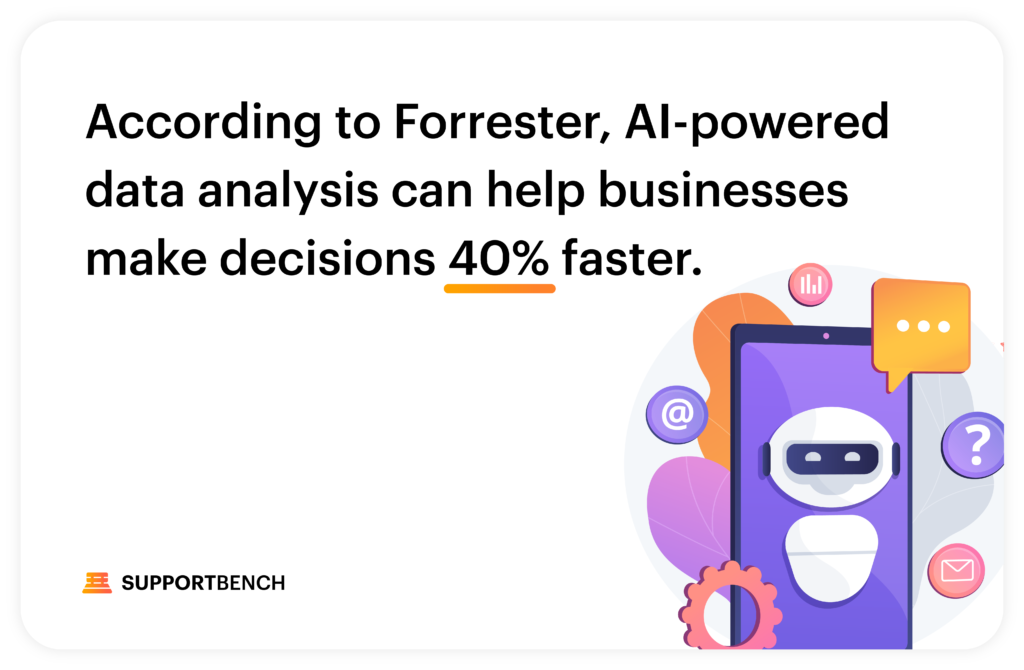The modern business landscape is evolving at a rapid pace, with AI technology leading the charge. Within the customer support sector, AI-driven summaries have emerged as a transformative tool. These summaries enable support teams to quickly distill complex information, drive decision-making, and deliver an enhanced customer experience. Here’s a look into how support teams, especially in B2B enterprises, can benefit from leveraging AI-powered summaries.

1. Enhanced Decision-Making through Rapid Insights
According to Forrester, AI-powered data analysis can help businesses make decisions 40% faster. This is particularly true for support teams where quick, informed decisions directly impact customer satisfaction. Consider a support team inundated with queries about a new product feature. An AI-driven summary can analyze thousands of tickets in minutes, identifying commonalities and pain points. This allows managers to quickly implement solutions or provide necessary training to agents. You can start by choosing an AI tool that integrates with your existing support system. Prioritize those that offer real-time analysis and customizable reporting to target your specific needs.
2. Proactive Problem Solving
Gartner predicts that by 2025, proactive (predictive) customer service interactions will outnumber reactive ones. AI-driven summaries play a crucial role in this shift by highlighting emerging issues before they escalate. An e-commerce business might be facing logistical challenges. If AI-driven summaries indicate that a high percentage of tickets relate to late deliveries, teams can proactively address the issue with the logistics provider. It’s important to set up automated daily or weekly AI summaries. Identify trends and ensure your team is equipped to address them proactively, maintaining a positive customer experience.
3. Personalizing Customer Interactions
As per Accenture, 91% of consumers are more likely to shop with brands that recognize, remember, and provide them with relevant offers and recommendations. If a subset of customers consistently reports issues or asks questions about a specific feature, AI summaries can highlight this trend. Support agents can then offer these customers personalized guidance or tutorials. You must implement AI tools that offer detailed customer segmentation based on interactions. This ensures support agents have a comprehensive view of past challenges, enhancing the customer’s experience.
4. Streamlining Agent Training and Onboarding
IBM states that businesses can reduce training time by up to 70% with the assistance of AI. AI-driven summaries can quickly identify areas where new agents struggle, allowing for targeted training. If an AI summary indicates that new agents struggle with resolving billing issues, a specialized training session can be organized to address this specific challenge. It’s vital to regularly review AI summaries focused on agent performance. Collaborate with training teams to design modules that address recurrent issues.
5. Optimizing Support Resources
McKinsey’s research suggests that 20% of a company’s resources are spent on activities that don’t add value. AI-driven summaries can help support teams pinpoint inefficiencies. If a particular issue frequently requires the involvement of senior team members, AI-driven summaries can help identify this trend. Support leaders can then create detailed knowledge base articles or FAQs to empower front-line agents to handle such issues independently. You can use AI summaries to analyze ticket escalations and resolutions. Focus on creating resources that empower your team to handle complex issues with greater autonomy.
Seeing the Bigger Picture with AI Summaries:
The importance of AI in shaping the future of customer support is evident. Companies like Supportbench are exemplifying this shift, taking an innovative approach to support by incorporating the latest AI technologies, such as Chatgpt, into their offerings. The AI-driven summaries and insights provided by such platforms don’t just streamline operations; they craft a customer experience that’s tailored, efficient, and deeply personalized.
In an era where data is abundant but actionable insights are scarce, the real winners will be those who harness the power of AI to make every interaction count. Supportbench, with its vision of seamless customer support management, data-driven innovation, and scalable infrastructure, is positioned to lead the charge in this new frontier. But not everyone is keeping up with this, and there is a cost associated.
The Cost of Ignoring AI-driven Summaries in Customer Support
As industries evolve with the help of emerging technologies, so do customer expectations. Today’s clients and partners anticipate swift, intelligent, and personalized responses. However, businesses that lag in adopting tools like AI-driven summaries risk more than just staying behind the curve. They may inadvertently create gaps in their support operations with long-term ramifications.
1. Decline in Operational Efficiency
While AI can process large volumes of data in seconds, manual data analysis is time-consuming and often misses nuanced patterns. Companies disregarding AI-driven tools find themselves buried under heaps of data, struggling to glean actionable insights. A firm receiving thousands of tickets monthly might take weeks to detect recurring issues if relying solely on manual reporting. Meanwhile, with AI-driven summaries, the same patterns can be identified and addressed within days. Companies must strive for real-time or, at the least, daily data analytics to keep up with the ever-evolving nature of customer interactions.
2. Escalating Customer Churn Rates
Harvard Business Review reveals that companies which fail to address customer issues promptly see an increase in churn rates by up to 15%. If customers repeatedly encounter unresolved problems, they’re likely to seek alternative service providers. Without the rapid insights from AI-driven summaries, businesses are slow to adapt to changing customer needs, resulting in dissatisfied clients leaving for competitors. But, maintaining a pulse on customer sentiment through regular AI-backed analyses can lead to more proactive solutions, reducing potential churn.
3. Reduced Agent Morale and Increased Burnout
A Deloitte survey suggests that employees empowered with the right tools are 70% more satisfied in their roles. Support agents overwhelmed by complex tickets without the benefit of AI insights might feel underequipped to handle challenges. This can lead to frustration, burnout, and higher attrition rates. But, investing in technologies that assist agents not only enhances customer experience but also boosts agent morale, reducing turnover costs.
4. Loss of Competitive Advantage
According to PwC, 72% of business leaders consider AI as a “business advantage.” As competitors harness AI to enhance their support infrastructure, companies disregarding this evolution might find themselves outpaced, losing market share. Whereas, regularly benchmarking your support processes against industry standards and adopt technologies that offer a competitive edge.
5. Increased Operational Costs
The MIT Sloan Review indicates that businesses using AI for analytics can reduce costs by up to 40%. Manual processes, redundant tasks, and the extended time to resolve issues can bloat operational costs. AI-driven efficiencies can streamline processes, resulting in significant cost savings. However, periodically assess operational costs with a keen eye on areas that might benefit from AI automation.
AI Summaries: No Longer Just an Option
In a digital age characterized by data abundance, the challenge is no longer about gathering information but deciphering it for actionable insights. While Supportbench and similar platforms champion the value of AI-driven insights for customer support, businesses need to recognize the broader picture.
Failing to adopt AI, particularly in areas as crucial as customer support, can have cascading consequences. From inefficiencies and ballooning costs to disillusioned employees and customers, the risks of inaction are tangible.
As more businesses venture into AI integration, those resistant to change will not just lose out on the potential benefits but may find themselves struggling to merely stay relevant in an AI-driven world.












